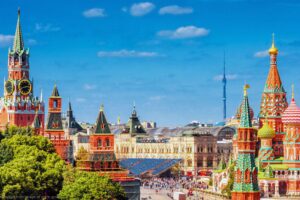JRL NEWSLINK: “5 Ideas to Explore: Russia Analytical Report, Oct. 24-31, 2022” – Russia Matters

1. Washington should convey to Moscow that the U.S. doesn’t seek Russia’s destruction and wants to avoid direct military conflict, according to David Ignatius. Furthermore, the U.S. should resume discussion of Putin’s 2021 calls for security assurances from NATO as the time has come “for urgent talks about how to keep this terrible war from becoming something vastly worse,” Ignatius argues in his latest WP column.
2. What would JFK do to tackle the Ukraine crisis? Graham Allison has inferred three Do’s and two Don’ts from John F. Kennedy’s handling of the Cuban missile crisis to answer that question. The Do’s include identifying American vital interests and focusing on objectives that are essential for meeting the challenge at hand. The Don’ts include “do not begin with an injunction not to use nuclear weapons.”
3. China should use its leverage with Russia to prevent a nuclear war, according to Zhou Bo of Tsinghua University, who writes that Beijing should tell Moscow to honor the P5’s statement that “nuclear war cannot be won and must never be fought.” Beijing could also play a significant role in brokering a deal between Russia and NATO that would halt the alliance’s expansion in exchange for Moscow agreeing not to use nuclear weapons.
4. Vladimir Putin goes beyond the Russian military doctrine’s language on use of nuclear weapons. “As for Russia…we have the Military Doctrine, and they should read it. One of its articles explains the cases when, why, in relation to what and how Russia considers it possible to use weapons of mass destruction in the form of nuclear weapons to protect its sovereignty, territorial integrity and to ensure the safety of the Russian people,” he told the Valdai Discussion Club last week. In contrast, Russia’s 2014 military doctrine says: “The Russian Federation shall reserve the right to use nuclear weapons in response to the use of nuclear and other types of weapons of mass destruction against it and/or its allies, as well as in the event of aggression against the Russian Federation with the use of conventional weapons when the very existence of the state is in jeopardy.” Loss of one border region in a conventional war would violate Russia’s territorial integrity, but it would not, arguably, amount to putting the very existence of the Russian state into jeopardy (if that’s the Sakhalin region, for instance).1
5. Russia’s elites have begun to ponder a future without Putin, according to the Economist. “This does not mean that Mr. Putin is about to bow out, be overthrown or fire a nuclear weapon. It does mean that those who run the country and own assets there are losing confidence in their president,” this British magazine writes. However, The Economist also reminds us that, as Alexei Navalny, Russia’s jailed opposition leader, has argued recently, the hope that “Mr. Putin’s replacement by another member of his elite will fundamentally change this view on war … is naive at the very least.” In contrast, Carnegie Endowment’s Andrei Kolesnikov believes that “the next Russian leader will almost certainly be forced to liberalize to ensure their survival” and “step back from military conflict.”…
